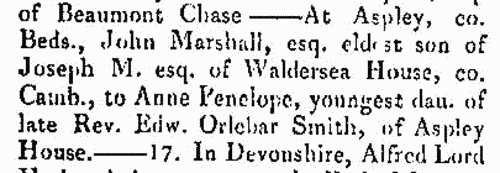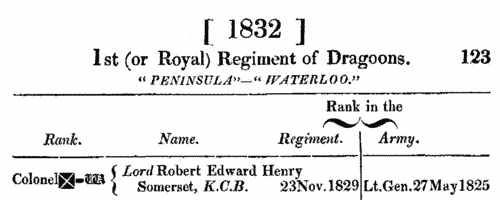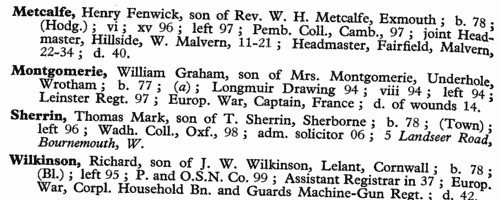Pedder Surname Ancestry ResultsOur indexes 1000-1999 include entries for the spelling 'pedder'. In the period you have requested, we have the following 276 records (displaying 111 to 120): Single Surname Subscription | | | Buying all 276 results of this search individually would cost £1,532.00. But you can have free access to all 276 records for a year, to view, to save and print, for £100. Save £1,432.00. More... |
These sample scans are from the original record. You will get scans of the full pages or articles where the surname you searched for has been found. Your web browser may prevent the sample windows from opening; in this case please change your browser settings to allow pop-up windows from this site. Deaths, Marriages, News and Promotions
(1826)
Death notices and obituaries, marriage and birth notices, civil and military promotions, clerical preferments and domestic occurrences, as reported in the Gentleman's Magazine. Mostly from England and Wales, but items from Ireland, Scotland and abroad.
PEDDER. Cost: £4.00.  | Sample scan, click to enlarge

| Dissolutions of Partnerships
(1826)
Trade partnerships dissolved, or the removal of one partner from a partnership of several traders
PEDDER. Cost: £6.00.  | Sample scan, click to enlarge

| Insolvents
(1827)
Insolvency notices for England and Wales: insolvency often caused people to restart their lives elsewhere, so these are an important source for lost linksPEDDER. Cost: £6.00.  | Sample scan, click to enlarge

| Bankrupts
(1828)
Bankruptcy notices for England and Wales: bankruptcy often caused people to restart their lives elsewhere, so these are an important source for lost links
PEDDER. Cost: £6.00.  | Sample scan, click to enlarge

| Buckinghamshire Freeholders: Great Missenden
(1831)
The poll of the freeholders of Buckinghamshire at the election of two knights of the shire to serve in Parliament, taken at Aylesbury 5, 6, 7 and 9 May 1831. The candidates were the Marquis of Chandos, John Smith esquire, and Pascoe Grenfell esquire. This poll book sets out the names of the voters in alphabetical order hundred by hundred and parish by parish. The freeholders' full names are stated, surname first, and the place of their abode (often elsewhere). The right hand column records their votes. The qualification for suffrage in the counties was the possession of a freehold estate worth more than 40s a year.PEDDER. Cost: £6.00.  | Sample scan, click to enlarge

| Deaths, Marriages, News and Promotions
(1831)
Death notices and obituaries, marriage and birth notices, civil and military promotions, clerical preferments and domestic occurrences, as reported in the Gentleman's Magazine. Mostly from England and Wales, but items from Ireland, Scotland and abroad.
PEDDER. Cost: £4.00.  | Sample scan, click to enlarge

| Liverpool Voters: Burgesses and Freemen
(1832)
A poll for the election of Members of Parliament for the Borough of Liverpool, between William Ewart esquire (E), Lord Viscount Sandon (S), Thomas Thornely esquire (T) and Major-General Sir Howard Douglas, baronet (D), took place on 12 and 13 December 1832. The poll book lists all voters with full name (surname first), occupation, address, and initials indicating for whom they voted. The lists are in six sections: Everton, Kirkdale, the parish of Liverpool, Toxteth Park, West Derby, and Liverpool burgesses and freemen. All householders of property worth £10 a year of more were entitled to vote.PEDDER. Cost: £6.00.  | Sample scan, click to enlarge

| Liverpool Voters: Kirkdale
(1832)
A poll for the election of Members of Parliament for the Borough of Liverpool, between William Ewart esquire (E), Lord Viscount Sandon (S), Thomas Thornely esquire (T) and Major-General Sir Howard Douglas, baronet (D), took place on 12 and 13 December 1832. The poll book lists all voters with full name (surname first), occupation, address, and initials indicating for whom they voted. The lists are in six sections: Everton, Kirkdale, the parish of Liverpool, Toxteth Park, West Derby, and Liverpool burgesses and freemen. All householders of property worth £10 a year of more were entitled to vote.PEDDER. Cost: £6.00.  | Sample scan, click to enlarge

| Officers of the British Army
(1832)
The annual Army List, published By Authority, first lists officers of the rank of major and above, by rank, and with dates of appointment to each successive higher rank; holders of crosses, crosses with clasps (with number of clasps indicated), medals, medals with clasps (with number of clasps indicated) are marked as such; and an ornate W indicates those officers actually present in any of the actions of 16, 17 or 18 June 1815 and therefore awarded the Waterloo Medal. For each officer in this section, the final column notes his then present or immediately former regiment and/or office, if any. Next, all the officers of the army are listed, down to the rank of ensign, by regiment or corps, giving rank, name, date of rank in the regiment, and date of rank in the army, with occasional further notes. Again, holders of medals are duly noted, as in the first list. For each regiment the paymaster, adjutant, quartermaster, surgeon and assistant surgeons are named, as well as the civilian agent; and the regimental motto, battle honours, and colours of the facings and lace of the dress uniform are stated. After the British regiments of the line, the officers of the West India infantry, the Ceylon rifles, the Royal African Colonial Corps, the Cape Mounted Riflemen, the Royal Newfoundland Veterans, and the Royal Malta Fencibles are given; then the officers of the garrisons and other military establishments in Great Britain, Ireland, North America and Gibraltar (with Malta); the Royal Artillery; Commissariat Department; Medical Department; Chaplains' Department; officers retained on full pay; officers on British half pay; and officers on Foreign half pay (including the German Legion, the Brunswick Cavalry, the Brunswick Infantry, Chasseurs Brittaniques, Corsican Rangers, Dillon's Regiment, the Greek Light Infantry, Malta Regiment, Meuron's Regiment, Roll's Regiment, Sicilian Regiment, Watteville's Regiment, and the York Light Infantry Volunteers).PEDDER. Cost: £4.00.  | Sample scan, click to enlarge

| Boys entering Sherborne School
(1823-1835)
The grammar school at Sherborne in Dorset, which doubtless existed from the creation of the diocese of Sherborne in 705, was refounded by king Edward VI in 1550. At the quatercentenary in 1950, a fourth edition of the Sherborne Register was published, listing boys entering the school during those four centuries. In truth, the materials for this register survive but fitfully before 1823; for some years, no names are known; sometimes all that is known is a surname. But from 1823 onwards the lists and the details get steadily more comprehensive. By the 20th century the boys are listed alphabetically by surname under term of entrance. Surname is given in bold, then christian names, name of father (surname and initials) and address; year of birth; house (a, School House; b, Abbey House; c, The Green; d, Harper House (formerly The Retreat); f, Abbeylands; g, Lyon House; h, Westcott House); whether represented the school at cricket (xi), football (xv), shooting (viii), &c.; year of leaving; summary of degrees, career &c.; and (in italics), address as of 1950. Names in the early lists marked with an asterisk are found inscribed on the oak panelling or on the stone walls of the former schoolroom. (F) in the lists indicates a foundationer, receiving free education: after 1827, when this privilege was restricted to boys from Sherborne and neighbourhood, nearly all foundationers were day-boys.PEDDER. Cost: £4.00.  | Sample scan, click to enlarge

|
Research your ancestry, family history, genealogy and one-name study by direct access to original records and archives indexed by surname.
|












